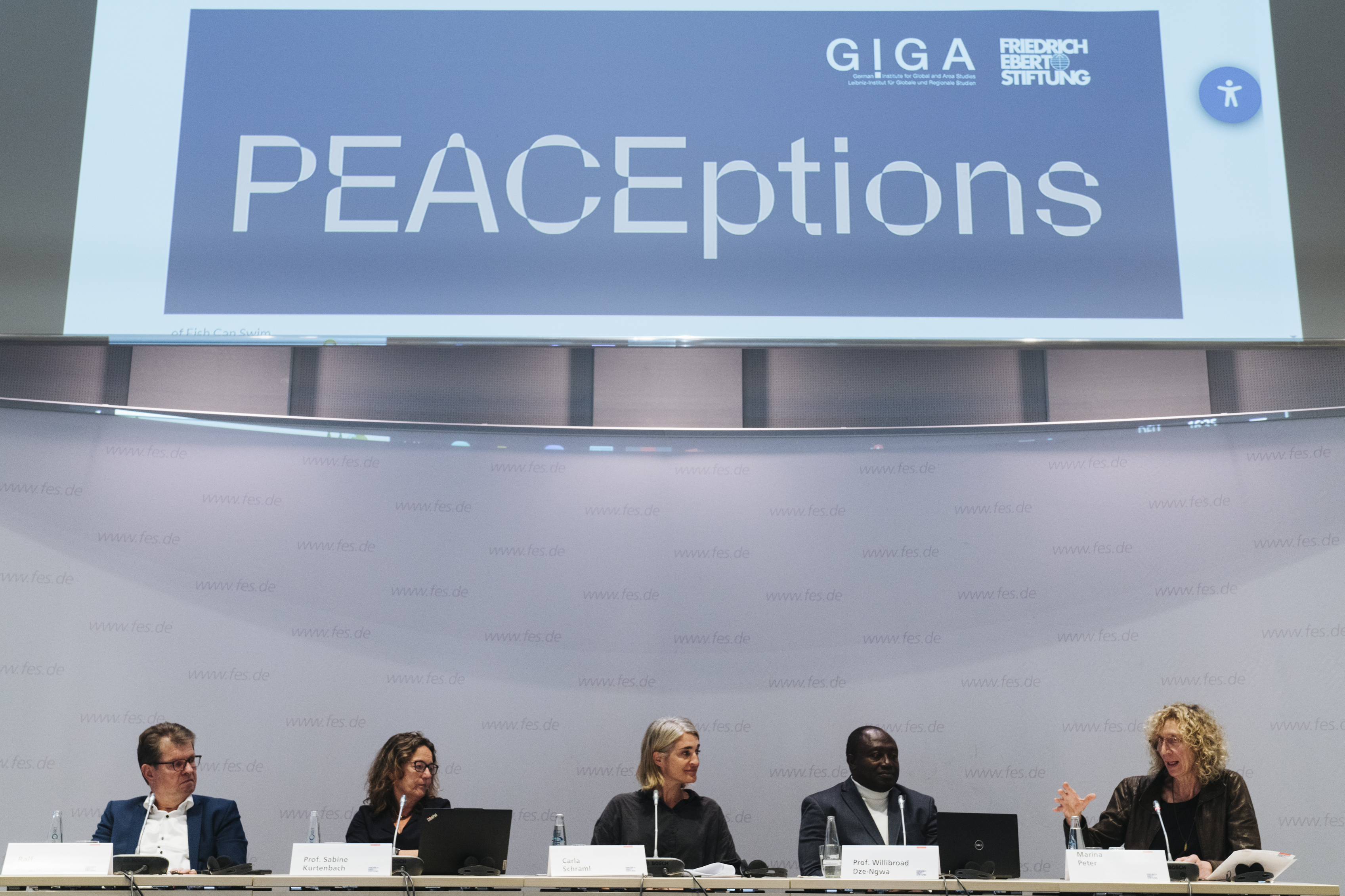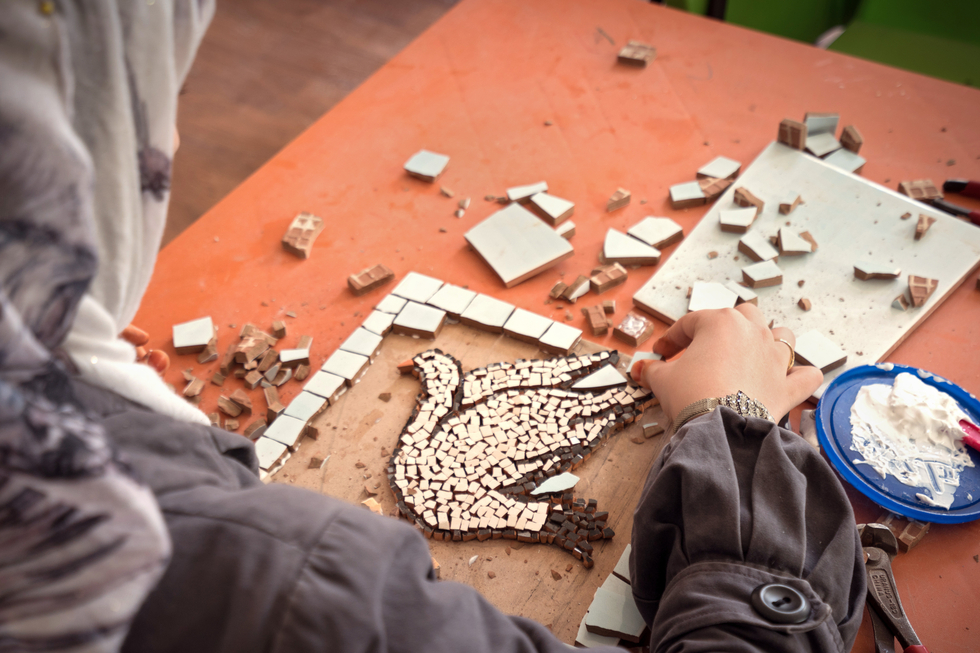Peaceptions: What is peace?

The PEACEptions Project
The joint project PEACEptions conducted by the German Institute for Global and Area Studies (GIGA) and the Friedrich-Ebert-Stiftung (FES) provides a conceptual framework in which different ideas of peace – ranging from the absence of war up to fundamental socio-political transformations – can be highlighted and their differences analysed in order to be able to formulate concrete proposals for peacebuilding. The selected countries (Cameroon, Colombia, the Philippines, South Sudan, Tunisia and Venezuela) show variations across conflict topics and manifestations of violence – from open war to state repression.
Hier geht's zur deutschen Version des Artikels.
‘What is peace?’ – this is the question at the heart of controversial debate surrounding the wars in Ukraine and the Middle East. While minimalist approaches to this question equate peace with the absence of war, others add attributes such as just, lasting and liberal to their models of peacebuilding. PEACEptions – a joint project conducted by the Hamburg-based German Institute for Global and Area Studies (GIGA) and the Friedrich-Ebert-Stiftung (FES) in Berlin – goes one step further, viewing peace as a process rather than a state. This approach focuses on three key elements that are crucial to any social order: the reduction of violence in all its manifestations, opportunities for social and political participation, and the co-existence of formal and informal institutions for conflict transformation.
Six case studies from four regions around the world
In collaboration with selected international offices of the Friedrich-Ebert-Stiftung and some of its partner organisations, we identified six countries (Colombia, Venezuela, Cameroon, the Philippines, Tunisia and South Sudan) with different conflicts at national and/or regional level, for instance between different ethnic groups within the country, each displaying various forms and intensities of violence such as organised crime or ethnic violence, for example.
In the next step, we collected quantitative and qualitative data on the three key elements mentioned above. Differences were identified both within and between individual societies.
In addition to the predominant forms of violence, such as collective violence, state repression or interpersonal violence (forms of psychological, physical and sexual violence), the opportunities for political, social and economic participation were also found to differ. For instance, political participation depends largely on the political regime – democratic or authoritarian. Formal opportunities for participation are also key for political and social initiatives aimed at containing violence and peacebuilding. On the one hand, a functioning democratic state governed by the rule of law provides opportunities for constructive conflict transformation; on the other hand, similar functions are performed at local level, for example by ‘traditional authorities’ (authorities and structures that coexist alongside official institutions).
The third step involved representative surveys in each of the selected countries where more than a thousand people were asked what the word ‘peace’ means to them. The main associations cited by the respondents were security, respect, a sense of calm, and justice.
Conversely, at the bottom of the list we have change, inclusion, education and health. Our focus groups and interviews confirmed that people’s understanding of peace is strongly linked to the specific personal experiences they have rather than to abstract ideas.
Shared and specific challenges
The results of the six studies were discussed by all the project participants at a three-day conference held at the Friedrich-Ebert-Stiftung in Berlin in October 2024 and in cooperation with the German Foundation for Peace Research (DSF). The findings show that, regardless of the differences in the specific conflict contexts, it is important to understand the interplay between local-level conflicts and conflicts at national level as well as the transnational dynamics in border regions. Across the three aforementioned key elements in society, there are various possibilities for dedicated action aimed at containing violent conflict and developing peacebuilding strategies. A good example of this is a group of mothers in Caracas, Venezuela, who succeeded in brokering what was essentially a successful ceasefire between different gangs.
A common problem in all of the countries studied is the deteriorating situation with freedom of the press, an issue that restricts the ability to provide independent reporting on violent conflict. This is tied to a question that will arise sooner or later, irrespective of the context, namely the question of how to identify and compensate victims and prosecute the perpetrators. The formal registration of victims of armed conflict introduced in Colombia underlines the role played by such measures in helping to bring an end to ongoing conflict. In fact, the Colombian peace process is the first in the world to see victims given the opportunity to voice their positions as part of the peace negotiations.
In countries where the International Criminal Court is active, such as Venezuela and the Philippines, there is a lack of willingness on the part of the relevant governments and judicial systems to seek justice for these crimes, since doing so might lead to the prosecution of former members of the government, for instance – something they do not wish to see happen. Other issues evident in all of the societies studied include forced displacement within and across national borders or the desire to migrate to other countries.
How can we translate the findings into peacebuilding strategies?
Regardless of the given conflict situation, it has proven fruitful to view peacebuilding and peace as an ongoing process. Civil society organisations such as religious communities, which are afforded a comparatively high level of trust in surveys, make a particularly important contribution here.
Women also play a key role in peacebuilding in various societies. Greater representation of women in peace processes have proven instrumental in building a peace that is more enduring. In some of the contexts studied (e.g. Cameroon), women’s organisations have played a positive role, be it through the deep impact they have had on armed conflict or by drawing international attention to conflicts in their countries.
The concept of peace as a process has proven useful across all the different contexts of violence and shows that it is not a question of carrying out peace processes in a specific order – first ending the war, then facilitating participation, then transformation. In fact, it is more expedient to find starting points for peacebuilding efforts that are geared towards the circumstances on the ground and factor in the perceptions of all those affected.
About
Dr Sabine Kurtenbach is a lead researcher at the German Institute for Global and Area Studies in Hamburg and a honorary professor at the Centre for Conflict Research at Philipps Universität Marburg. Her research interests include peacebuilding, violence, institutions and youth in postwar societies of the Global South.
The opinions and statements of the guest author expressed in the article do not necessarily reflect the position of the Friedrich-Ebert-Stiftung.
